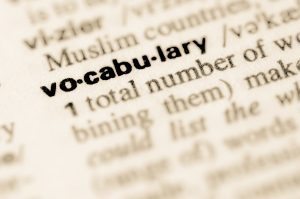 Did you know that almost no one uses their full vocabulary when writing?
Did you know that almost no one uses their full vocabulary when writing?
Most people have a “comfort-zone” vocabulary of about 20,000 words, with a larger, “passive” database of about 40,000 words. Shakespeare, the recognized master of wordplay, used about 70,000 different words in his plays―an immense number, to be sure, but still less than half of the words catalogued in the Oxford English Dictionary.
Seems like even an average active vocabulary would be enough to work with, right? But here’s the thing: according to the Reading Teachers’ Book of Lists, the first 25 words of our active vocabulary are used in 33% of our everyday writing, and the first 1,000 words are used in 89% of our everyday writing!
What this means to you as a writer is this: the perfect words to express what you’re trying to say are out there, and you probably even know them, but you will have to override your “Top 1,000” programming to access them.
The Top 1,000 aren’t just a personal phenomenon. We also have a collective Top 1,000―a cache of words that are used so often online and in the media that they’ve lost their punch. Words like beautiful, unique, important, inspirational, and amazing are definitely part of the collective Top 1,000. These words are so common that they’ve become ambiguous: they capture a general energy, but don’t tell the reader anything specific because everyone defines them differently.
If you really want to capture your audience and get your message across loud and clear, don’t rely on the same old “workhorse” words. Instead, choose words which proclaim every nuance of your meaning and intention clearly.
Here are 5 ways you can move past your Top 1,000 programming and consciously choose the right words for every situation.
- Pay attention. You’ll notice that you have a set of go-to words for just about every subject, person, or thing. For example, do you describe every emotional roadblock as “challenging,” or every bubble bath as “soothing”? Do you tend to use the same call to action in every blog, or start every third sentence with “However”? Once you identify your own patterns, you can begin to adjust them.
- Make a list. Make a list of words that crop up in your everyday writing. (To be clear, I’m not talking about irreplaceable pronouns like “you” and “us,” but descriptive words like adjectives and adverbs.) Choose one word a time to work on. For example, for a week, every time you write “beautiful,” stop, and find a more evocative word that fits your message to a tee.
- Read―and not just in your chosen genre. A lot of us pick up our go-to words because other writers in our field use them, too. Every genre has its own subset vocabulary, so by reading across the board you’ll open yourself up to new voices as well as new words.
- Buy a thesaurus. An old-fashioned thesaurus is a fabulous tool for finding new and interesting words to replace your old, worn-out standards. You can also find specialized thesauri and dictionaries for specific genres. (Even more fun: use the oldest thesaurus you can find. Reviving an old-fashioned word or phrase is a great way to grab your readers’ interest.)
- Do “A word a day.” You can buy a fun, tear-away paper calendar with your “word of the day” on each page, or simply open the dictionary at random each morning and pick a new word. Try to use your word in conversation over the course of the day to implant it in your memory bank. The more words you practice with, the more you will have at your immediate disposal.
Writing isn’t like face-to-face conversation. In dialogue, you can rephrase or repeat yourself if your listener doesn’t understand what you’re trying to say. But when you’re writing, you only have once chance to get your point across. Choosing targeted words outside the usual daily spectrum ensures that your writing will leave little to no room for interpretation, and therefore offer your readers a crystal-clear picture of your energy, intention, and message.
Just like the art of writing itself, expanding beyond your Top 1,000 words takes practice, dedication, and a lot of trial and error. Have fun with the process.
Engage in wordplay!
If you need a little boost, post your go-to words in the comments, and I’ll give you some synonyms!
Until next time, happy writing!


0 comments